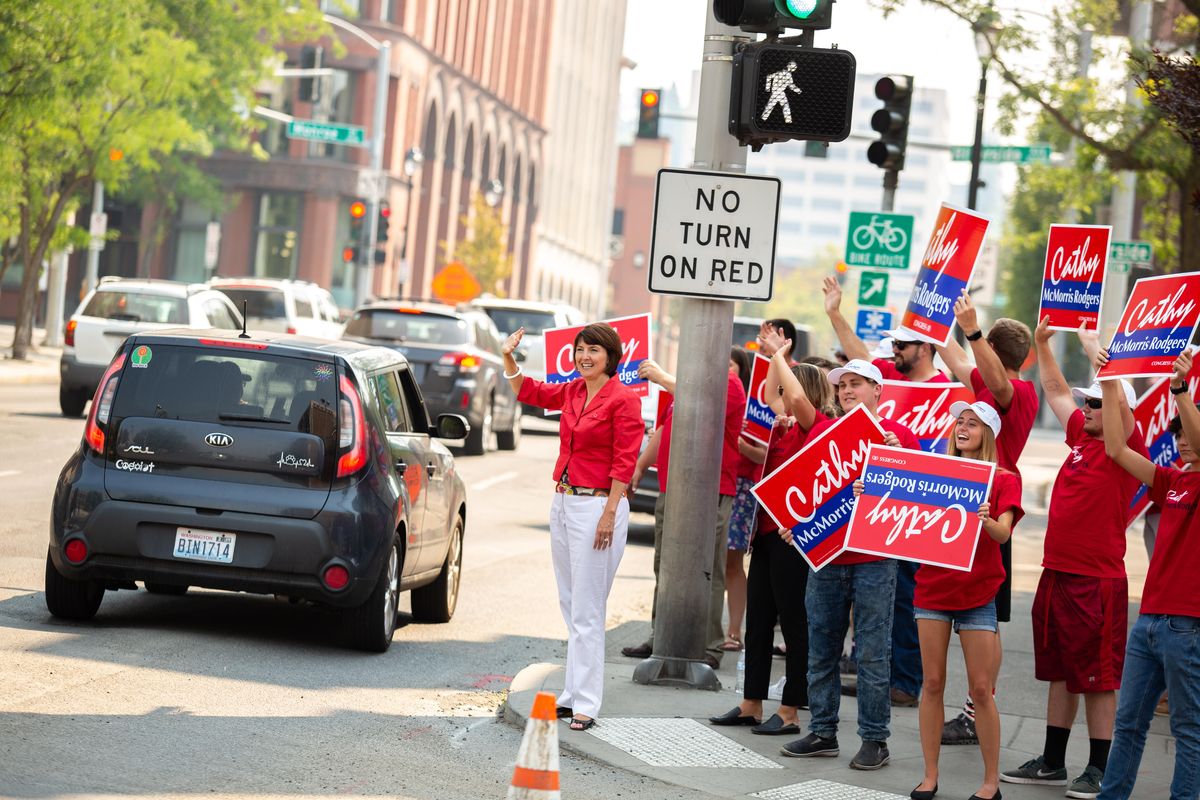Results point to real contest: Cathy McMorris Rodgers, Lisa Brown nearly tied in primary
Cathy McMorris Rodgers waves to passing drivers alongside campaigners Tuesday at the corner of Monroe and Main. (Libby Kamrowski / The Spokesman-Review)Buy a print of this photo
There’s no doubt now. The race for Congress in Eastern Washington is for real.
Out of more than 120,000 votes counted, Republican U.S. Rep. Cathy McMorris Rodgers had a lead of a little more than 500 votes in Tuesday’s primary over Democrat Lisa Brown.
The contest, between the high-ranking congressional Republican and a Democrat with years of experience in state political leadership, has drawn national interest and big spending as the parties vie for support in the first midterm election since President Donald Trump took office.
Buoyed by the down-ticket performance of other Democrats, a beaming Brown took the stage before a crowd of 150-plus Democratic supporters at the Carpenters Hall in Spokane’s Logan Neighborhood.
“What this vote means to me is that the incumbent has had her time,” Brown told cheering supporters. “And after 14 years, that time is up.”
McMorris Rodgers, who spoke to supporters at her campaign office on Second Avenue in downtown Spokane after the early returns, said she’s not concerned about the primary election results because they’re still preliminary.
“We still have more ballots to count,” she said. “I’m going to continue to talk to the voters of Eastern Washington about my record of results as well as my vision. I will continue to listen to people to hear their concerns, but also to make sure that they know I am here to make a difference and to be a leader that gets results.”
Brown won Spokane and Whitman counties. McMorris Rodgers won in Walla Walla, Pend Oreille, Ferry, Asotin, Garfield, Stevens and Columbia counties.
The McMorris Rodgers campaign stressed that, adding the totals of other candidates in the race, the Republican share of the vote was still roughly 53 percent. That’s about the same as it was in the 2016 primary, when McMorris Rodgers only received 42 percent of the vote but cruised to a general election victory.
The difference is that Brown did significantly better than Joe Pakootas, the Democrat in that race who only won 32 percent of the primary vote.
Also, roughly 40,000 of the votes left to count in the race are from Spokane County, where Brown posted a comfortable lead of more than 7 percentage points over McMorris Rodgers in early returns.
Brown performed significantly better than all those who have come before her in a primary contest against the fourth-ranking Republican in the House of Representatives. Democrats have typically picked up about 30 percent of the primary vote in Eastern Washington dating back to 2004, the congresswoman’s first campaign.
Peter Goldmark posted the previous best primary result against McMorris Rodgers, earning 40 percent of early ballots en route to a 13-percentage-point defeat in November 2006.
Voters responded to the apparent two-candidate race that has been emerging since Brown announced her long-rumored candidacy at the end of August last year. She and McMorris Rodgers combined for more than 94 percent of the vote, with less than 5 percent of voters straying to candidates Jered Bonneau and Dave Saulibio, who were running to McMorris Rodgers’ right politically.
Since announcing her candidacy, she’s engaged in a tight money race and war of words with McMorris Rodgers, with the prominent Republican releasing a volley of pre-primary ads depicting Brown as soft on crime and big on taxes.
In a speech to supporters, Brown attacked McMorris Rodgers on her positions on health care, abortion and the negative ads that the congresswoman has been running against her.
“More than half the people are ready for a change, and we’re not going to take anything for granted,” Brown said in an interview. “We expect a lot more voters to turn out in November.”
Polls and pundits have been pitching the race as the closest battle McMorris Rodgers has seen for the seat she’s held since 2004, when she won an open contest following the retirement of Rep. George Nethercutt. Nethercutt unseated the region’s longest-serving representative in Congress, former House Speaker Tom Foley, in 1994. Optimistic Democrats have drawn parallels to that race, hoping Brown will do something a laundry list of progressive leaders haven’t in a decade: defeat McMorris Rodgers in a November upset.
Conservatives are gearing up for a fight as well. In the minutes after results were published, the Congressional Leadership Fund – a super PAC backed by House Speaker Paul Ryan – and the Republican National Committee issued statements challenging Brown on health care and government spending.
Spokesman-Review staff writer Amy Edelen contributed to this report.

